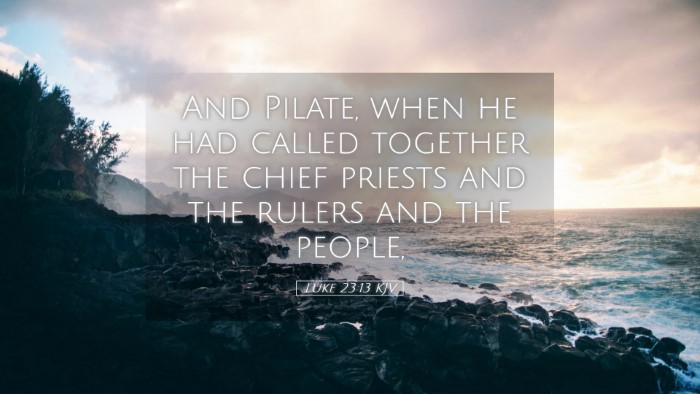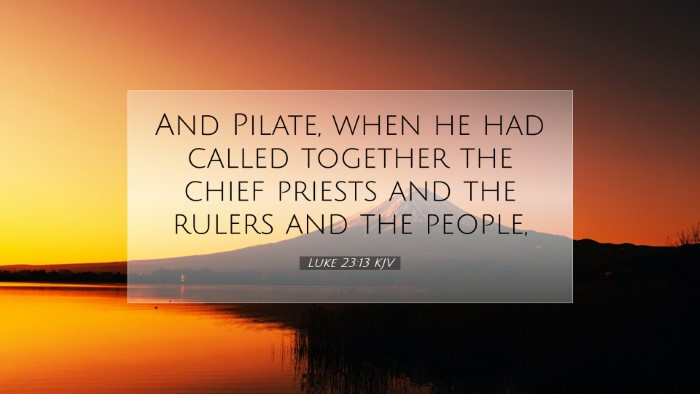Bible Commentary on Luke 23:13
Verse: "And Pilate, when he had called together the chief priests and the rulers and the people," (Luke 23:13)
This verse marks a significant moment in the Gospel narrative of Luke, a crucial juncture in the Passion account where Pilate is confronted with the decision regarding the fate of Jesus. It serves as a microcosm of the greater themes of authority, justice, and the moral quandary faced by humans when upholding truth against societal pressures.
Contextual Analysis
This verse occurs within the Passion narrative, situated between the trial of Jesus and the crowd's fervent call for His crucifixion. Pilate, the Roman governor of Judea, symbolizes the secular authority that grapples with the profound implications of the spiritual battle at play. Commentators highlight how the socio-political landscape of the time had created a perfect storm for the life and death of Jesus to unfold in such a chaotic manner.
Insights from Matthew Henry
Matthew Henry emphasizes Pilate's role and the motivations behind his gathering of the religious leaders and the populace. He notes that Pilate recognized the determination of the chief priests and others to see Jesus condemned, underscoring the "malicious envy" that fueled their accusations. Henry articulates that this moment illuminates the guilty conscience of the Jewish leaders, who could not bear the idea of their authority being challenged by Jesus' teachings.
Reflections from Adam Clarke
Adam Clarke provides a commentary on the procedural aspect of Pilate's actions. He notes Pilate’s attempt at due process by summoning the chief priests, rulers, and the people. Clarke suggests that Pilate's actions display a measure of political maneuvering; he sought to appease the masses while attempting to absolve himself of guilt regarding an innocent man's condemnation. This demonstrates the dilemma faced by leaders when moral integrity conflicts with the will of the people.
Albert Barnes' Exegesis
Albert Barnes offers a theological perspective, linking this gathering to the concept of corporate responsibility. Barnes posits that Pilate's assembly reflects a communal rejection of Christ, highlighting how the sin of one individual can extend to a collective national guilt. He suggests that this foreshadows the eventual destruction of Jerusalem, as such rejection leads to severe consequences, both historically and spiritually.
Key Theological Themes
- Authority and Accountability: The gathering of leaders illustrates the struggle between divine authority and human governance. It raises questions about the extent of accountability that leaders have when faced with moral decisions.
- Public Sentiment vs. Truth: Pilate's choice to gather the people's input indicates a theme prevalent throughout history: the inherent tension between public opinion and objective truth.
- The Role of Conscience: The verse highlights the profound implications of Pilate's conscience as he grapples with the decision of condemning an innocent man, a reflection of the universal struggle against moral corruption.
Examination of Character Motivations
Exploring the characters involved in this narrative presents a vivid tapestry of human emotions and motivations. Pilate, representing the Roman authority, is portrayed as unwilling to act decisively against the pressure of the crowd and the chief priests. Matthew Henry notes that Pilate's hesitance shows his lack of moral courage, reflecting a broader theme of compromised leadership.
In contrast, the chief priests and rulers exhibit a determination to maintain their influence and power, resorting to deceit to eliminate their threat in the form of Jesus. Their motivations illuminate the dangers of spiritual blindness when authority is threatened, leading them to conspire against the very embodiment of truth.
Application for Today's Audience
This passage serves as a potent reminder for contemporary leaders, pastors, and theologians regarding the importance of integrity in leadership. In a world where public opinion often sways decisions, the challenge remains to uphold truth and justice, even in the face of adversity. The behaviors of Pilate, the chief priests, and the crowd show the consequences of yielding to societal pressure and the moral implications of neglecting one's responsibilities.
Moreover, students of Scripture can draw parallels between the ancient world and today's cultural challenges. The refusal to stand firm for truth, often seen in various sectors of society, calls for a reinvigoration of the values upheld by Jesus and His followers.
Conclusion
Luke 23:13 serves as a catalyst for deep theological reflection and practical application. By examining the motivations and actions of those involved in Jesus' trial, along with the commentary provided by respected theologians, we can uncover vital lessons on authority, integrity, and the perilous consequences of rejecting truth. As the world continues to navigate moral complexities, the insights from this pivotal verse remain ever relevant.


